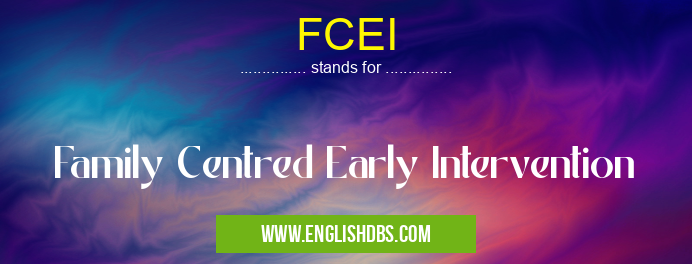What does FCEI mean in HEALTHCARE
Family Centred Early Intervention (FCEI) is an evidence-based intervention strategy that focuses on providing comprehensive support to children and their families starting at a young age. This approach acknowledges the importance of the family for providing an environment for a child's development and gives them the tools and resources necessary to foster healthy growth. It works to assist individuals with disabilities, impairments, or those from a disadvantaged background, by intervening in their early stages of life and helping them progress throughout the various stages of development.

FCEI meaning in Healthcare in Medical
FCEI mostly used in an acronym Healthcare in Category Medical that means Family Centred Early Intervention
Shorthand: FCEI,
Full Form: Family Centred Early Intervention
For more information of "Family Centred Early Intervention", see the section below.
» Medical » Healthcare
What is FCEI?
FCEI stands for Family Centred Early Intervention, which stresses the importance of family involvement in delivering services to young children with special needs or those at risk for developmental delays. These interventions often begin during infancy as part of an individualized plan developed in partnership with parents and health care providers according to the unique needs of each child. The goal of FCEI is to help families build on their strengths in order to promote optimal development and prepare children for success in school and beyond. Interventions may include therapeutic interventions such as physical therapy, speech therapy, occupational therapy, etc., social-emotional supports, educational supports such as Individualized Education Plans (IEPs) or 504 plans or a combination thereof depending on each child's needs. A major focus of FCEI is ensuring access to quality services via assessments, referrals, case management supports, teaching strategies within natural settings and direct treatment provided by qualified professionals.
Essential Questions and Answers on Family Centred Early Intervention in "MEDICAL»HEALTHCARE"
What is Family Centered Early Intervention?
Family Centered Early Intervention (FCEI) is an approach to providing early intervention services that puts the family at the center of the process. It emphasizes building a strong family-professional partnership and supports families in their goals for their child's development.
Who offers FCEI services?
FCEI services are typically provided by specially trained and certified practitioners who work as part of a transdisciplinary team, which includes representatives from health, education, and other service sectors.
How do I know if my child needs FCEI services?
If you have concerns about your child's development or if your child has been diagnosed with a developmental disability or delay, you may want to discuss your concerns with your pediatrician and/or contact the local early childhood intervention program in your area to ask about eligibility for early intervention services.
What does FCEI offer for families?
FCEI offers guidance and support to families by providing information on how to best meet their child's individual needs so they can be successful at home and in the community. FCEI also provides an opportunity for families to connect with other parents of children with special needs and helps them develop meaningful connections with their communities.
How does the FCEI process work?
The FCEI process begins when a family contacts an early intervention program. An intake worker will then assess the family's situation and determine what types of services would be most appropriate for the family's specific situation. An individualized plan is then developed with input from all members of the transdisciplinary team. After this plan is in place, professionals provide direct therapy support as well as coaching and mentoring to help parents take part in activities that will improve outcomes for their children.
How often do families receive assistance through the FCEI process?
The frequency of assistance depends on each individual family's needs; however, it is generally recommended that families participate in ongoing assessment, review meetings every three months or so, as well as receiving additional guidance throughout this period as needed.
Are there any costs associated with FCEI services?
Families are not required to pay for some forms of early intervention — such as speech therapy, occupational therapy or physical therapy — but there may be fees associated with certain specialized therapies or equipment used during sessions. Your local early childhood intervention program should be able to inform you about funding options available in your community or state.
Where can I learn more about FCEI?
There are several resources available online that can provide more information on Family Centered Early Intervention including websites operated by organizations such as National Center on Birth Defects & Developmental Disabilities (NCBDDD) and American Academy of Pediatrics (AAP), books on related topics written by professionals within the fields of health care, education research, and policy makers; social media forums hosted by organizations dedicated to raising awareness; webinars; workshops; conferences; etc.
Does participation in FCEI always involve meeting directly with professionals?
Not necessarily — while many face-to-face sessions may occur between families and professionals over the course of treatment within an early learning environment; technology has allowed for various forms communication (such as e-mail correspondence or telephone calls) depending upon individual circumstances so that families can access support from wherever they are located. Additionally telehealth has also become more common place allowing people increased access regardless of geographic boundaries.
Final Words:
Family Centred Early Intervention is an evidence-based approach that works to provide comprehensive support systems for children with exceptionalities or those who are at risk for developmental delays as well as their families; it emphasizes the role of families in developing individualized plans tailored to each child's unique needs while recognizing that parents are best equipped to make decisions about what is best for their child. Through this approach, families have access to assessments, referrals, case management supports, teaching strategies within natural settings and direct treatment provided by qualified professionals—all aimed at helping children reach their greatest potentials regardless of their situations or backgrounds.
